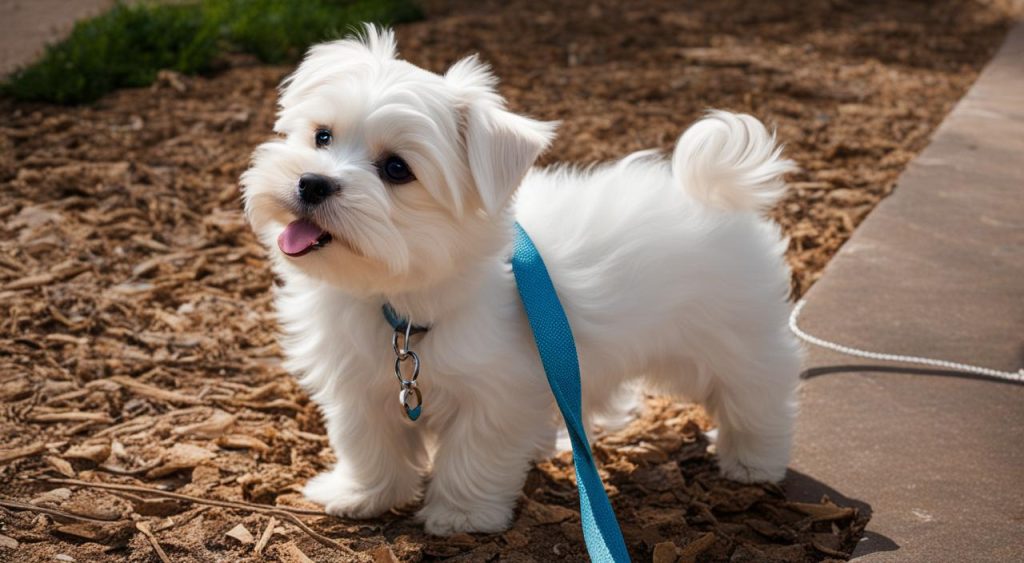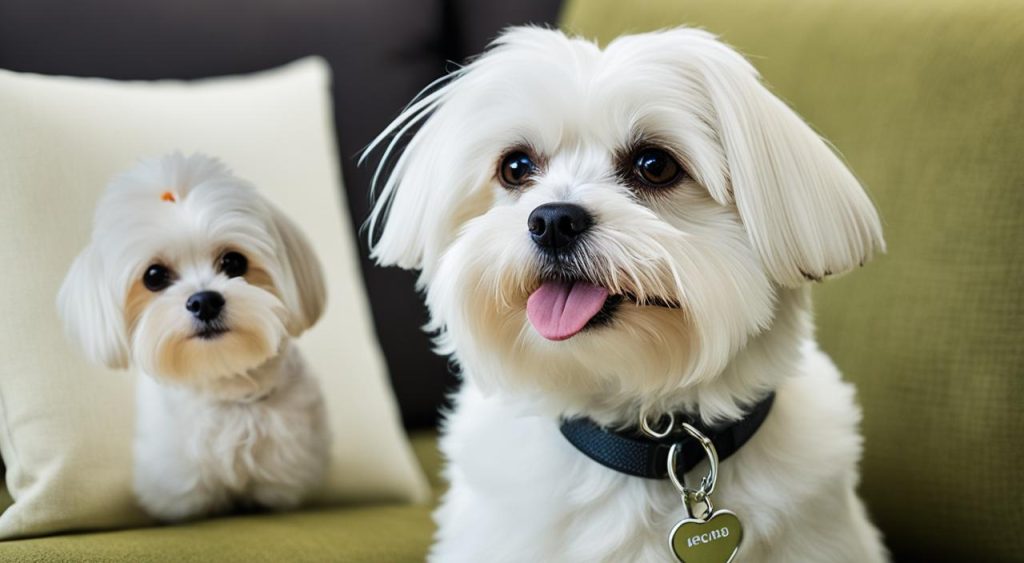When it comes to training and disciplining a Maltese, it’s important to approach the process with patience and positive reinforcement. Punishment and physical discipline will not be effective and can damage the trust and bond between you and your dog. Instead, focus on utilizing positive discipline methods that encourage good behavior and obedience.
Maintaining consistency in your training approach is crucial. Start training your Maltese from a young age to establish good habits and reinforce boundaries. By setting clear rules and expectations, you can effectively correct any unwanted behaviors and promote a well-behaved companion.
Understanding the unique behavioral traits of Maltese dogs is also essential in their training. These dogs are energetic, affectionate, and intelligent. They may exhibit separation anxiety if left alone for extended periods and can sometimes be stubborn. By familiarizing yourself with their characteristics, you can tailor your training methods accordingly.
Positive reinforcement is a key aspect of disciplining a Maltese. Reward your dog with treats, praise, and playtime when they exhibit desired behaviors. This will help them associate good behavior with positive outcomes and motivate them to repeat these actions.
Remember to be patient and firm in your approach. Consistency is key in disciplining your Maltese, so stick to your training methods and expectations. Avoid physical punishment, as it can cause fear and anxiety in your dog. Instead, focus on building a loving and trusting relationship through positive discipline techniques.
Socialization is also an important component of training a Maltese. Introduce your dog to various environments, people, and animals to help them develop confidence and appropriate behavior. By gradually exposing them to new experiences and rewarding good behavior, you can effectively discipline your Maltese.
In conclusion, disciplining a Maltese requires a combination of patience, positive reinforcement, and understanding of their unique traits. By employing effective training methods and building a strong bond with your dog, you can ensure they become a well-behaved and happy companion.
Key Takeaways:
- Discipline your Maltese using positive reinforcement.
- Start training your Maltese from a young age to establish good habits.
- Understand the behavioral traits of Maltese dogs, such as separation anxiety and intelligence.
- Use treats, praise, and playtime to reward good behavior.
- Be patient, firm, and consistent in your training approach.
Understanding Maltese Behavior
When it comes to understanding Maltese behavior, it’s important to recognize their unique traits and tendencies. Maltese dogs are known for their energy, affectionate personality, and unwavering loyalty to their owners. However, like any dog breed, they have their own set of behavioral characteristics that need to be understood and managed effectively in order to provide them with proper discipline and training.
One important aspect of Maltese behavior is their susceptibility to separation anxiety. These dogs form strong bonds with their owners and can become anxious or even destructive when left alone for extended periods. It’s crucial to address this issue by gradually acclimating them to spending time alone and ensuring they have plenty of mental stimulation and exercise to keep them occupied.
In addition to separation anxiety, Maltese dogs are highly intelligent and trainable. They have the capacity to learn a wide range of commands and tricks but may exhibit stubbornness at times. Patience, consistency, and positive reinforcement are key when it comes to training a Maltese. Using rewards such as treats and praise to reinforce good behaviors will yield the best results.
Understanding the exercise needs of a Maltese is also an important aspect of managing their behavior. Despite their small size, these dogs have a moderate level of energy and require regular physical activity to stay happy and healthy. Daily walks and playtime should be incorporated into their routine to prevent boredom and excess energy, which can lead to undesirable behaviors.
To summarize, a thorough understanding of Maltese behavior is essential for effective discipline and training. Recognizing their energy levels, affectionate nature, tendencies towards separation anxiety, and intelligence will allow you to tailor your approach to their unique needs. By providing them with the right balance of mental stimulation, exercise, and positive reinforcement, you can ensure your Maltese is well-behaved and happy.
Start Training Early
When it comes to disciplining a Maltese, one of the most important factors is to start training early. By introducing your Maltese puppy to basic obedience commands and establishing good habits right from the beginning, you can set the foundation for a well-behaved companion.
Consistency is key in discipline, and starting early allows your Maltese to learn and understand the rules and boundaries of acceptable behavior. This means consistently reinforcing positive behaviors and gently correcting unwanted behaviors.
To establish good habits in your Maltese, incorporate positive reinforcement methods into your training. This can include rewards such as treats and praise when your Maltese follows commands or exhibits good behavior. Positive reinforcement not only helps in teaching good habits but also strengthens the bond between you and your furry friend.
When training a Maltese puppy, it is important to introduce obedience commands early on. By teaching them basic commands like sit, stay, and come, you can ensure better obedience as they grow older. Obedience commands also make it easier to control their behavior in different situations, ensuring their safety and the safety of others.
Use Positive Reinforcement
Positive reinforcement is a powerful tool when it comes to disciplining your Maltese. By rewarding good behavior with treats, praise, and playtime, you can effectively reinforce positive outcomes and encourage your Maltese to repeat desired behaviors. Consistency in using positive reinforcement is key to achieving effective discipline.
When your Maltese displays good behavior, make sure to provide immediate rewards and show appreciation. Treats and verbal praise are excellent ways to let them know they’ve done something right. Additionally, incorporating playtime into the training process can further reinforce positive behavior.
Using positive reinforcement not only helps in disciplining your Maltese but also strengthens the bond between you and your furry friend. It creates a positive and loving environment, making the training process more enjoyable for both of you.
Consistency is key throughout the positive reinforcement process. Make sure to establish clear expectations and consistently reward good behavior. By doing so, your Maltese will quickly understand what is expected of them and learn to associate positive outcomes with their actions.
In addition to treats and praise, it is essential to understand what motivates your Maltese. While some may be more food-driven, others might respond better to verbal affirmation or affectionate gestures. Discovering what rewards are most enticing to your furry companion can enhance the effectiveness of positive reinforcement training.
Remember, discipline should always be administered in a kind and positive manner. Avoid punishments or physical corrections, as these can create fear and anxiety in your Maltese. Positive reinforcement focuses on rewarding good behavior, which ultimately helps shape your Maltese into a well-behaved and happy companion.
Be Patient & Firm
When it comes to disciplining your Maltese, patience and firmness are key. It’s important to remember that training takes time, and your Maltese may not learn immediately. Patience in Maltese training allows you to stay calm and composed, even when faced with challenging behaviors.
Firmness in Maltese discipline ensures that your dog understands the boundaries and rules you set. It’s crucial to be consistent with your training methods, as inconsistency can confuse your Maltese and impede their progress. By being firm and consistent, you establish yourself as the leader and guide your Maltese towards good behavior.
Instead of resorting to physical punishment, focus on correcting bad behaviors in your Maltese with verbal corrections and rewards. Verbal corrections, such as a firm “no,” can help your dog understand what is expected of them. On the other hand, rewards for desired behaviors reinforce positive actions and motivate your Maltese to continue behaving well.
Consistency in discipline and expectations is crucial for effective training. Ensure that everyone in your household follows the same training approach and enforces the same rules. This consistency helps your Maltese understand what behaviors are acceptable and what are not. Over time, with patience, firmness, and consistent training, you can correct bad behaviors in your Maltese and foster a loving and well-behaved companion.
Socialize Your Maltese
Socialization plays a crucial role in disciplining your Maltese. Exposing them to various environments, interacting with other animals and people, and setting boundaries for their behavior are essential for their overall development.
Introducing your Maltese to new environments helps them develop confidence and adaptability. Take them for walks in different neighborhoods or parks, gradually exposing them to new sights, sounds, and smells. This exposure will help them feel more comfortable and less anxious when encountering unfamiliar surroundings in the future.
Interacting with other animals and people is also vital for socialization. Arrange playdates with other friendly dogs, ensuring supervised and positive interactions. This helps your Maltese learn how to properly communicate and behave around other animals. Similarly, introducing them to various people, including friends, family, and strangers, helps them become more comfortable in different social situations.
Setting boundaries for your Maltese’s behavior is another crucial aspect of socialization. Teach them basic obedience commands such as “sit,” “stay,” and “come.” These commands establish a clear communication channel between you and your Maltese and help them understand what is expected of them. Consistent reinforcement and positive rewards are key to encouraging and maintaining good behavior.
Remember to always be patient and understanding during the socialization process. Gradually introduce your Maltese to new experiences, allowing them to adjust at their own pace. Reward and praise good behavior, reinforcing that positive behavior leads to positive outcomes. This approach encourages your Maltese to continue exhibiting appropriate behavior and further strengthens the bond between you and your furry companion.
By prioritizing socialization, you are equipping your Maltese with the necessary skills to navigate the world confidently and behave appropriately in various situations. Remember, socialization is an ongoing process that requires patience, consistency, and positive reinforcement. Embrace this journey as an opportunity to strengthen the bond with your Maltese while helping them become a well-rounded and obedient companion.
Conclusion
Disciplining a Maltese requires patience, consistency, and an understanding of their unique behavioral traits. By using effective training methods, you can build a strong bond with your Maltese and ensure a well-behaved and happy companion.
Positive reinforcement is a key factor in achieving discipline with your Maltese. Rewarding good behavior with treats, praise, and playtime helps them associate positive outcomes with their actions, encouraging them to repeat desired behaviors.
Starting training early is crucial for establishing good habits and boundaries. Consistency in discipline and obedience commands from a young age helps your Maltese understand expectations and ensures they grow into well-mannered dogs.
In addition to training, it is important to provide your Maltese with regular exercise and mental stimulation. This not only helps release their energy but also keeps their minds engaged, reducing the likelihood of boredom-related behavioral issues.
By following these effective training methods, you can discipline your Maltese in a positive and rewarding way, creating a strong bond between you and your furry friend. Remember to be patient, firm, and understanding, and enjoy the process of training and nurturing your Maltese into a well-behaved and joyful companion.





